Related Research Articles

James Leonard Farmer Jr. was an American civil rights activist and leader in the Civil Rights Movement "who pushed for nonviolent protest to dismantle segregation, and served alongside Martin Luther King Jr." He was the initiator and organizer of the first Freedom Ride in 1961, which eventually led to the desegregation of interstate transportation in the United States.

Frederick Lee Shuttlesworth was a U.S. civil rights activist who led the fight against segregation and other forms of racism as a minister in Birmingham, Alabama. He was a co-founder of the Southern Christian Leadership Conference, initiated and was instrumental in the 1963 Birmingham Campaign, and continued to work against racism and for alleviation of the problems of the homeless in Cincinnati, Ohio, where he took up a pastorate in 1961. He returned to Birmingham after his retirement in 2007. He worked with Martin Luther King Jr. during the civil rights movement, though the two men often disagreed on tactics and approaches.
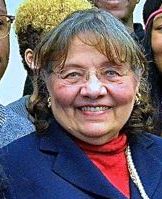
Diane Judith Nash is an American civil rights activist, and a leader and strategist of the student wing of the Civil Rights Movement.
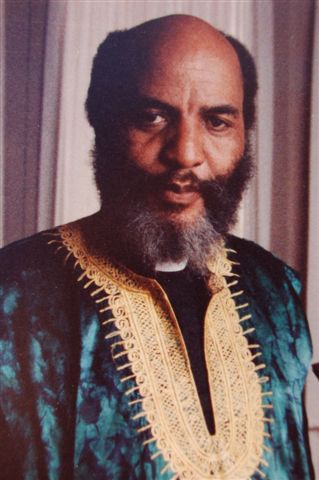
James Luther Bevel was a minister and leader of the 1960s Civil Rights Movement in the United States. As a member of the Southern Christian Leadership Conference (SCLC), and then as its Director of Direct Action and Nonviolent Education, Bevel initiated, strategized, and developed SCLC's three major successes of the era: the 1963 Birmingham Children's Crusade, the 1965 Selma voting rights movement, and the 1966 Chicago open housing movement. He suggested that SCLC call for and join a March on Washington in 1963. Bevel strategized the 1965 Selma to Montgomery marches, which contributed to Congressional passage of the 1965 Voting Rights Act.

Ruby Doris Smith-Robinson worked with the Student Nonviolent Coordinating Committee (SNCC) from its earliest days in 1960 until her death in October 1967. She served the organization as an activist in the field and as an administrator in the Atlanta central office. She eventually succeeded James Forman as SNCC's executive secretary and was the only woman ever to serve in this capacity. She was well respected by her SNCC colleagues and others within the movement for her work ethic and dedication to those around her. SNCC Freedom Singer Matthew Jones recalled, "You could feel her power in SNCC on a daily basis". Jack Minnis, director of SNCC's opposition research unit, insisted that people could not fool her. Over the course of her life, she served 100 days in prison for the movement.
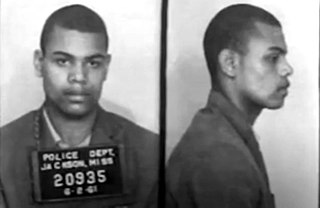
Cordell Hull Reagon was an American singer and activist. He was the founding member of The Freedom Singers of the Student Nonviolent Coordinating Committee (SNCC), a leader of the Albany Movement and a Freedom Rider during the Civil Rights Movement.
The Freedom Singers originated as a quartet formed in 1962 at Albany State College in Albany, Georgia. After folk singer Pete Seeger witnessed the power of their congregational-style of singing, which fused black Baptist a cappella church singing with protest songs and chants, their performances drew aid and support to the Student Nonviolent Coordinating Committee (SNCC) during the emerging civil rights movement. Seeger suggested The Freedom Singers as a touring group to the SNCC executive secretary James Forman as a way to fuel future campaigns. As a result, communal song became essential to empowering and educating audiences about civil rights issues and a powerful social weapon of influence in the fight against Jim Crow segregation. Rutha Mae Harris, a former freedom singer, speculated that without the music force of broad communal singing, the civil rights movement may not have resonated beyond of the struggles of the Jim Crow South.

Bernard Lafayette, Jr. is an American civil rights activist and organizer, who was a leader in the Civil Rights Movement. He played a leading role in early organizing of the Selma Voting Rights Movement; was a member of the Nashville Student Movement; and worked closely throughout the 1960s movements with groups such as the Student Nonviolent Coordinating Committee (SNCC), the Southern Christian Leadership Conference (SCLC), and the American Friends Service Committee.
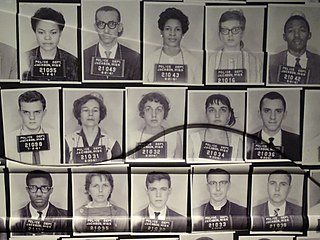
Freedom Riders were civil rights activists who rode interstate buses into the segregated Southern United States in 1961 and subsequent years to challenge the non-enforcement of the United States Supreme Court decisions Morgan v. Virginia (1946) and Boynton v. Virginia (1960), which ruled that segregated public buses were unconstitutional. The Southern states had ignored the rulings and the federal government did nothing to enforce them. The first Freedom Ride left Washington, D.C. on May 4, 1961, and was scheduled to arrive in New Orleans on May 17.
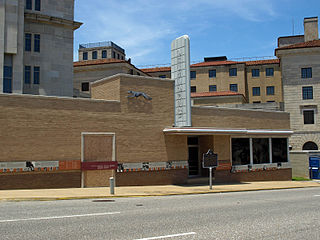
The Freedom Rides Museum is located at 210 South Court Street in Montgomery, Alabama, in the building which was until 1995 the Montgomery Greyhound Bus Station. It was the site of a violent attack on participants in the 1961 Freedom Ride during the Civil Rights Movement. The May 1961 assaults, carried out by a mob of white protesters who confronted the civil rights activists, "shocked the nation and led the Kennedy Administration to side with civil rights protesters for the first time."

Charles Melvin Sherrod was an American minister and civil rights activist. During the civil rights movement, Sherrod helped found the Albany Movement while serving as field secretary for southwest Georgia for the Student Nonviolent Coordinating Committee. He also participated in the Selma Voting Rights Movement and in many other campaigns of the civil rights movement of that era.
Charles Person is an African-American civil rights activist who participated in the 1961 Freedom Rides. He was born and raised in Atlanta, Georgia. Following his 1960 graduation from David Tobias Howard High School, he attended Morehouse College. Person was the youngest Freedom Rider on the original Congress of Racial Equality Freedom Ride. His memoir Buses Are a Comin': Memoir of a Freedom Rider was published by St. Martin's Press in 2021.
William E. Harbour was an American civil rights activist who participated in the Freedom Rides. He was one of several youth activists involved in the latter actions, along with John Lewis, William Barbee, Paul Brooks, Charles Butler, Allen Cason, Catherine Burks, and Lucretia Collins.
Edward Norval "Ed" Blankenheim was an American civil rights activist and one of the original 13 Freedom Riders who rode Greyhound buses in 1961 as part of the Civil Rights Movement, in an effort to desegregate transit systems.
Henry "Hank" James Thomas is an African American civil rights activist and entrepreneur. Thomas was one of the original 13 Freedom Riders who traveled on Greyhound and Trailways buses through the South in 1961 to protest racial segregation, holding demonstrations at bus stops along the way.
This is a timeline of the civil rights movement in the United States, a nonviolent mid-20th century freedom movement to gain legal equality and the enforcement of constitutional rights for people of color. The goals of the movement included securing equal protection under the law, ending legally institutionalized racial discrimination, and gaining equal access to public facilities, education reform, fair housing, and the ability to vote.
Frederick Leonard is an American activist who was involved in the civil rights movement.
Catherine Burks-Brooks is an American civil rights movement activist, teacher, social worker, jewelry retailer, and newspaper editor.
Benjamin Elton Cox was an American civil rights movement activist and preacher. Cox participated in the 1961 Freedom Riders protest and was interviewed in the 2010 film of the same name.

Bruce Carver Boynton was an American civil rights leader who inspired the Freedom Riders movement and advanced the cause of racial equality by a landmark supreme court case Boynton v. Virginia.
References
- 1 2 3 "Reagon, Meryle Joy". Civil Rights Digital Library. Retrieved 5 March 2018.
- 1 2 3 4 Arsenault, Raymond (2 November 2011). Freedom Riders: 1961 and the Struggle for Racial Justice, PDF eBook Freedom Riders: 1961 and the Struggle for Racial Justice. Oxford University Press. p. 211. ISBN 9780199792429.